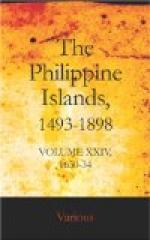“Finally the governor saw that he could by no means conquer them; but, on the contrary, his men informed him that, judging by the courage and valor which they showed, they would suffer till all the pools and wells in Unjen were drained, rather than give in. He therefore lost all hope of a victory over them, and decided to order that they be taken to Nangasaqui, although he would not do so before his departure for the court at Meaco; for he thought that it would diminish his prestige to have them enter as victors into that city while he was there. After his departure, therefore, he sent on the way advice to his deputy whom he left there, to bring them to Nangasaqui. This he accordingly did on the fifth of January, placing Beatriz de Acosta in a certain house, and putting the five religious into the public prison, where they still remain. Such was the victorious end of this battle, wherein our holy faith was nobly vindicated, the Christians encouraged, and the tyrant overcome and confounded, quite the contrary of what he had expected and promised.
“During the same time this governor seized and sent to Sendo [95] the wives and daughters of the holy martyrs who have perished in Nangasaqui from the year 1617 to the present one, one thousand six hundred and thirty-two—separating many of them, who were already married, from their husbands and sons. They all accepted captivity for so holy a cause with a good will, and before leaving protested before the governor that they were and always would be Christians. Three Christians were taken prisoners for the faith in Fingo at the beginning of the year 631. One of them died most happily in the prison, a short time ago; and the other two, father and son, remain in captivity. In Xiqui there were thrown alive into the sea for the faith, on the twelfth of February past, Thome and Ynes, his wife; likewise in Firando, a short time ago, another man was thrown into the sea for the same cause.
“In Oxu [96] a man became a Christian fraudulently; and, after learning about the principal Christians of Vacamatzu and Ayzu from one of our household of Ojaca, called Paulo, he went and gave a list thereof to the governors of Tenca. These immediately advised the governors of the first two places, and there those whom the talebearer had given in the list were taken prisoners—among them Brother Juan Yama, of our Society, who was one whom I had catechized and baptized. Thus far we have not learned whether they have been martyred or not.
“The governors of Tacacu sent the same information regarding Paulo, who, although he was not in that city, was so diligently sought after that they succeeded in arresting him; and some time afterward he, with his wife Maria and four sons, suffered martyrdom. This led to a furious persecution, not only in Oxu, but likewise in other parts of the country, and in the cities of Cami, Meaco, Fugimi, Ojaca, and Sacay. The cruelty of the tyrant reached such a point that he sent this year, as exiles to Manilla, even the infirm and leprous Christians of the before-mentioned cities of Cami; and already more than ninety of them are at Nangasaqui, awaiting the monsoon, and others are expected to go. With this, under the holy benediction of your Reverence, etc. March 22, 1632.




